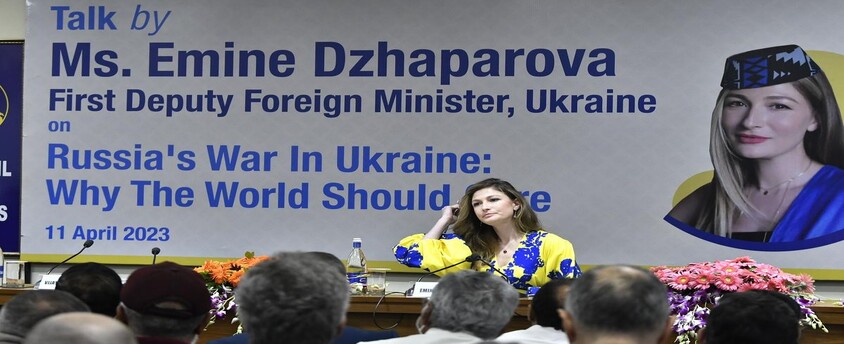Indian diplomacy and the horses of interest, morality
26, Apr 2023

Prelims level : International Relations
Mains level : GS-II International Relations | Bilateral, Regional and India and Neighbourhood Relations
Why in News?
- Ukraine’s First Deputy Minister of Foreign Affairs Emine Dzhaparova recently made her official visit to India.
- During her visit to India, Emine Dzhaparova said that she was happy to visit India which gave birth to many sages, saints and gurus.
- She noted that India aims to become the “Vishwaguru” i.e. the global teacher and arbiter.
- The Minister further added that Ukraine is currently witnessing aggression against innocent victims and supporting Ukraine is the only right choice for a true ‘Vishwaguru’.
A wider view on Indian Foreign Policy:
- Various foreign diplomats and experts have pointed out the wide variance between India’s ambitions to become a moral teacher and the pursuit of interests in not criticising Russia’s aggression over Ukraine.
- Even though India has expressed its discomfort over Russia’s action against Ukraine and the Prime Minister has often said that “this is not an era of war”, various countries have tried to put pressure on India to criticise Russia openly.
- India has often been criticised for the contradictions in what it prescribes for the global community and what it pursues itself.
- When India criticised the action in Vietnam, diplomats questioned India’s relative “silence” on Soviet operations in Hungary, Czechoslovakia, and Afghanistan.
- Experts opine that there is a basic difference between the Indian discourse on foreign affairs earlier and the policies that are being projected now as part of the Vishwa Guru project.
- Earlier, India’s foreign policy principles were based on the contemporary global order’s principles.
- But, now, Indian foreign policies are being driven by the wisdom of ancient India and the belief that its application would contribute to the welfare of the entire world.
Change in India’s foreign policy:
- It is often pointed out that India has not been the only country that has pursued its interests while criticising others for not following globally established principles.
- For instance, the U.S. while advocating democracy for the rest of the has partnered with some of the most powerful dictators to further its interests.
- Further, the decades of support extended by the U.S. and other Western countries to the apartheid regime in South Africa also expose their hypocrisy.
- India, despite being in opposition to the apartheid regime and playing a role of a leader in the decolonisation process, had not used combative language to criticise the West’s hypocrisy in the past.
- However, this has now changed with the Indian External Affairs Minister leading the charge.
- The External Affairs Minister in various instances has directly pointed out the contradictions in Western prescriptions to the rest of the world with respect to the Ukraine war and the pursuit of its own interests.
- He also famously stated that India’s reputation was not made by a newspaper in New York.
- It is now believed that Indian traditions of spiritual democracy, the celebration of diversity, harmony with nature, the framing of social welfare policies with a focus on the interests of the poorest in mind, and the idea of the world as a family can be of great value to address various issues the world is currently facing.






